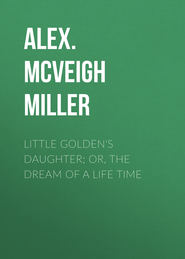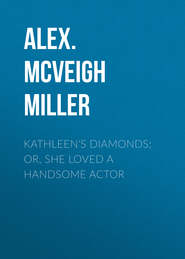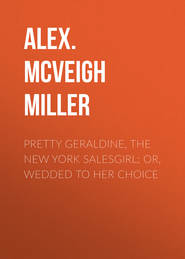По всем вопросам обращайтесь на: info@litportal.ru
(©) 2003-2024.
✖
Lancaster's Choice
Автор
Год написания книги
2018
Настройки чтения
Размер шрифта
Высота строк
Поля
They went on toward the ruins.
Leonora, with a deeper color in her fair face, bent over her sketch and rapidly put some finishing touches to it.
"Now I wonder where little Johnnie can be?" she thought.
She glanced up and saw Captain Lancaster coming back to her.
CHAPTER XXVI
He came on quickly toward the figure sitting among the graves, with the small head poised defiantly, although Leonora was thinking to herself:
"He is coming to scold me, perhaps, for trespassing on his property."
He came up to her and stood bareheaded before her with the sunlight falling on his fair head—tall, stalwart, handsome—a living Lancaster among those dead and gone ones; one who did no discredit to the name.
"I beg your pardon for interrupting you," he said; "but—you are sketching the ruins?"
"Yes."
"Will you let me see your work?"
She held it out to him in silence.
He scrutinized it in mingled wonder and delight.
"How perfect! how spirited! how beautiful!" he cried. "You must have real talent!"
"Thank you!" she answered, with a slight inclination of her head.
He stood watching the half-averted face a moment in silence. It had a slightly bored air, as if she wished he had not come, or that he would, at least, soon go.
"You are very brave, Miss West, sitting here all alone among these graves," he said, after that momentary pause.
"Did you leave your friends to come back and tell me that?" inquired she, with delicate sarcasm.
"No-o," slowly; "I came back to ask a favor, Miss West."
"Indeed?" incredulously.
"Yes; and it is this: I should like to have that sketch. My friend, Lady Adela, is in raptures over that pile of old ruins. She would like to have a picture of it."
He was watching her closely. He was rewarded for his intent scrutiny by seeing an angry crimson flush the round cheek.
"You would like this for her?" said Leonora, with ominous calmness.
"Yes; will you part with it?—for money, if you will. It is singularly perfect, and should be worth something considerable."
"You are very kind," said Leonora.
She had pulled a flower from a grave, and was tearing its petals apart with fierce cruelty between her white fingers.
"No; I am only just," he said; then, with a smile. "Ah! Miss West, do not be so cruel to that poor flower. I have a shuddering conviction that it is, metaphorically, myself you are deliberately annihilating."
She glanced up to him rather curiously from beneath her shady lashes.
"I—did not really think what I was doing," she said. "Why should you think I would treat you that way?"
"Because I have been so unfortunate as to incur your dislike," he answered.
She did not utter the denial he half hoped she would, but she threw her mutilated flower from her with a quickly suppressed sigh.
"Well, am I to have the sketch?" he inquired, after waiting vainly for an answer.
"No."
"You refuse?" he asked, chagrined.
"Yes. I drew the picture for myself, not for Lady Adela," she replied, spiritedly.
"She will be disappointed at my failure to secure it for her," said he.
"That does not matter to me," Leonora returned, coldly. "Why does she not make a picture for herself?"
"She does not sketch."
"Ah! is it beneath her dignity?" asked the girl.
"No, but beyond her power," he returned.
"Really?" asked the girl.
"Yes," he replied; "she assures me that she has no talent at all in that way. You who are so clever, Miss West, might afford to pity her."
"I do, but not because she can not draw," said Leonora.
"Why, then?"
"Because, for all her high birth and proud position, she will have to sell herself for money."
The shot told. She saw his cheek grow red.
"Mrs. West has been telling her these things. I wish to Heaven she had held her tongue!" he thought, bitterly. But aloud he said, lightly: "Perhaps you may find it expedient to do the same thing, Miss West."
"To do what?" she inquired.
"To marry for money," he replied.
"And you think it would be expedient?" she inquired, drawing her delicate black brows together in a vexed little frown.
Leonora, with a deeper color in her fair face, bent over her sketch and rapidly put some finishing touches to it.
"Now I wonder where little Johnnie can be?" she thought.
She glanced up and saw Captain Lancaster coming back to her.
CHAPTER XXVI
He came on quickly toward the figure sitting among the graves, with the small head poised defiantly, although Leonora was thinking to herself:
"He is coming to scold me, perhaps, for trespassing on his property."
He came up to her and stood bareheaded before her with the sunlight falling on his fair head—tall, stalwart, handsome—a living Lancaster among those dead and gone ones; one who did no discredit to the name.
"I beg your pardon for interrupting you," he said; "but—you are sketching the ruins?"
"Yes."
"Will you let me see your work?"
She held it out to him in silence.
He scrutinized it in mingled wonder and delight.
"How perfect! how spirited! how beautiful!" he cried. "You must have real talent!"
"Thank you!" she answered, with a slight inclination of her head.
He stood watching the half-averted face a moment in silence. It had a slightly bored air, as if she wished he had not come, or that he would, at least, soon go.
"You are very brave, Miss West, sitting here all alone among these graves," he said, after that momentary pause.
"Did you leave your friends to come back and tell me that?" inquired she, with delicate sarcasm.
"No-o," slowly; "I came back to ask a favor, Miss West."
"Indeed?" incredulously.
"Yes; and it is this: I should like to have that sketch. My friend, Lady Adela, is in raptures over that pile of old ruins. She would like to have a picture of it."
He was watching her closely. He was rewarded for his intent scrutiny by seeing an angry crimson flush the round cheek.
"You would like this for her?" said Leonora, with ominous calmness.
"Yes; will you part with it?—for money, if you will. It is singularly perfect, and should be worth something considerable."
"You are very kind," said Leonora.
She had pulled a flower from a grave, and was tearing its petals apart with fierce cruelty between her white fingers.
"No; I am only just," he said; then, with a smile. "Ah! Miss West, do not be so cruel to that poor flower. I have a shuddering conviction that it is, metaphorically, myself you are deliberately annihilating."
She glanced up to him rather curiously from beneath her shady lashes.
"I—did not really think what I was doing," she said. "Why should you think I would treat you that way?"
"Because I have been so unfortunate as to incur your dislike," he answered.
She did not utter the denial he half hoped she would, but she threw her mutilated flower from her with a quickly suppressed sigh.
"Well, am I to have the sketch?" he inquired, after waiting vainly for an answer.
"No."
"You refuse?" he asked, chagrined.
"Yes. I drew the picture for myself, not for Lady Adela," she replied, spiritedly.
"She will be disappointed at my failure to secure it for her," said he.
"That does not matter to me," Leonora returned, coldly. "Why does she not make a picture for herself?"
"She does not sketch."
"Ah! is it beneath her dignity?" asked the girl.
"No, but beyond her power," he returned.
"Really?" asked the girl.
"Yes," he replied; "she assures me that she has no talent at all in that way. You who are so clever, Miss West, might afford to pity her."
"I do, but not because she can not draw," said Leonora.
"Why, then?"
"Because, for all her high birth and proud position, she will have to sell herself for money."
The shot told. She saw his cheek grow red.
"Mrs. West has been telling her these things. I wish to Heaven she had held her tongue!" he thought, bitterly. But aloud he said, lightly: "Perhaps you may find it expedient to do the same thing, Miss West."
"To do what?" she inquired.
"To marry for money," he replied.
"And you think it would be expedient?" she inquired, drawing her delicate black brows together in a vexed little frown.











